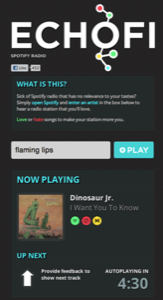For many users of Spotify, the feature that’s most painfully absent from the music streaming service is a recommendation engine for songs and artists. After all, listeners have come to expect this feature after years of it being available in Internet radio products like Pandora and Last.fm.

Echofi is a new Web app that hopes to solve this problem. It takes Spotify’s music library and mashes it up with the API from The Echo Nest, a powerful music intelligence platform that contains data about more than 30 million songs.
The result is a Pandora-style radio station based on your musical tastes and fueled by tracks from Spotify. Enter an artist’s name and hit the “play” button to launch Spotify and songs by similar artists will begin playing. Like on Pandora, you can even vote songs up or down to help train Echofi to better understand what you’re truly into.
The Echo Nest, a Massachusetts-based company founded in 2005, uses acoustic analysis, data-mining, natural language processing and machine learning to listen to and understand music, learning about its characteristics and defining relationships between various songs and artists. It’s like Pandora’s Music Genome Project, but on a much bigger scale. Whereas Pandora boasted 800,000 songs in its database at the time of its IPO, The Echo Nest has analyzed over 30 million. The Echo Nest platform powers nearly 200 music apps, including from some notable players like MOG, the BBC and MTV.
Spotify, which launched in the United States this summer, does not have a built-in recommendation engine of any kind, even though similar services like Rdio offer the feature.
With Echofi, Spotify is as close as it’s ever come to offering decent music recommendations. Its sure to be a welcome addition to the service, but it’s not without its limitations. For one, users can only create a radio station based on an artist’s name. Last.fm lets you do so using artist name or genre, while Pandora gets even more granular by offering stations based on individual songs.

There are also a few minor user experience issues. For one thing, the Spotify desktop application has a tendency to un-minimize itself when each new song beings, a slightly annoying flaw that creator Andy Smith acknowledges in the FAQ. We found it strange that hitting the “love” button on a song resulting in Echofi skipping to the next song. That behavior makes sense if we vote a song down, but if we say we like it, that should imply that we’d like to keep listening.
The Echofi Web app itself is nicely-designed with an interface about as simple as they come. If you’re accustomed to using the audio controls on your keyboard to play, pause and skip tracks in Spotify, you’ll have to get out of that habit to use Echofi. Since it’s browser-based, it doesn’t use those keys, and the actual song order originates from the Web app, not from the Spotify desktop app.
Overall, we found the experience of using Echofi to be pretty fluid and enjoyable, despite a few minor issues. We’d love to see this kind of functionality built right into the Spotify app, whether by integrating Echofi or something like it. Whatever Spotify may have been planning (if anything) for a recommendation engine, the developers behind Echofi have already made a considerable head start.

















